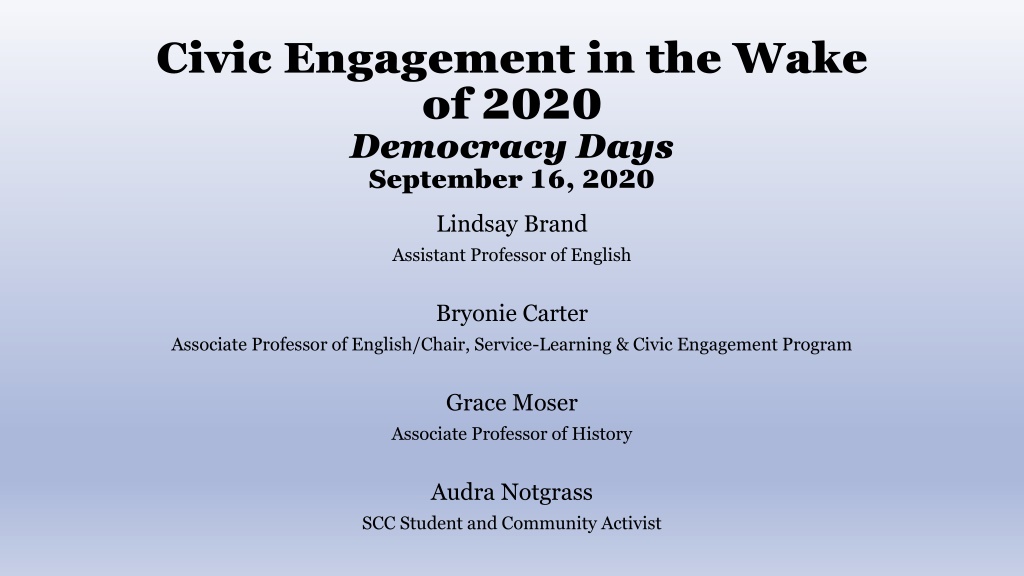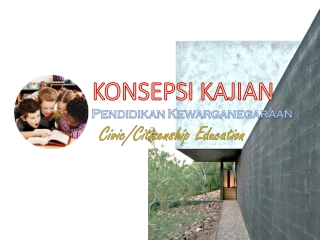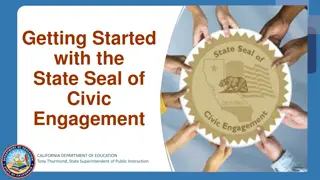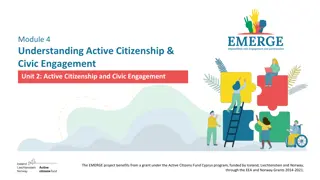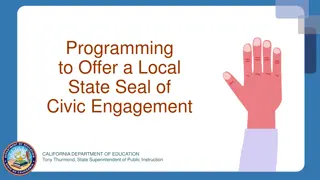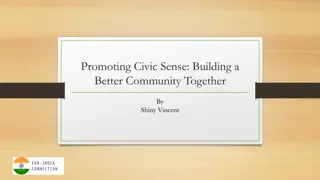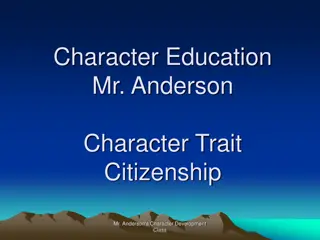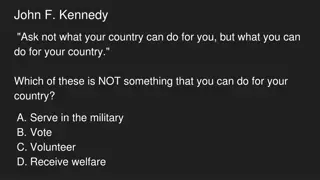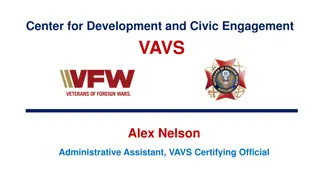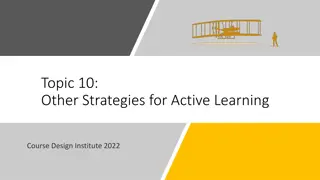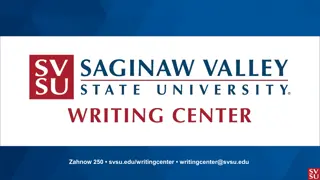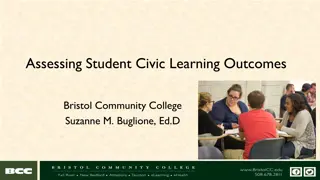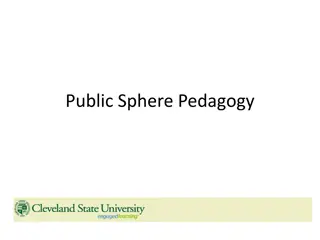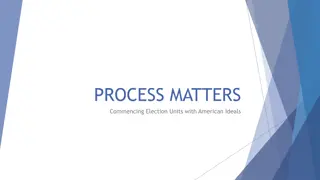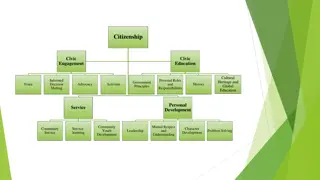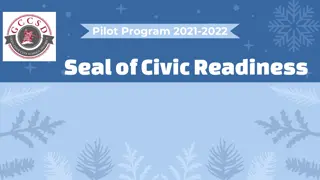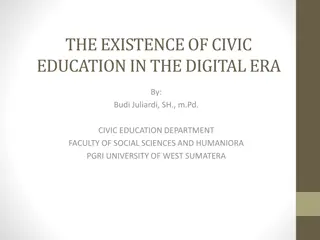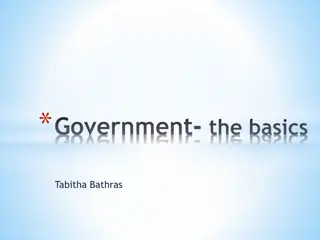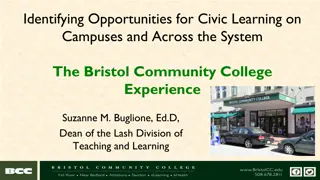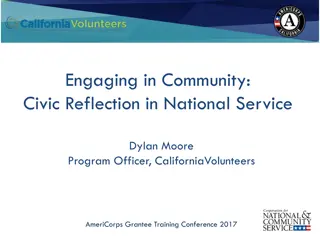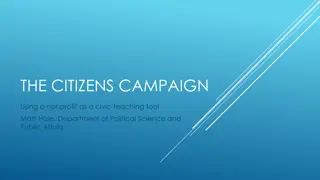Understanding Civic Engagement and Service-Learning in Higher Education
Civic engagement encompasses contributing to community welfare through various processes, while service-learning integrates community initiatives with coursework for student development. This discussion covers the importance, experiences, and opportunities for involvement in civic engagement both in-person and virtually, highlighting the SCC's Service-Learning & Civic Engagement program.
Download Presentation

Please find below an Image/Link to download the presentation.
The content on the website is provided AS IS for your information and personal use only. It may not be sold, licensed, or shared on other websites without obtaining consent from the author. Download presentation by click this link. If you encounter any issues during the download, it is possible that the publisher has removed the file from their server.
E N D
Presentation Transcript
Civic Engagement in the Wake of 2020 Democracy Days September 16, 2020 Lindsay Brand Assistant Professor of English Bryonie Carter Associate Professor of English/Chair, Service-Learning & Civic Engagement Program Grace Moser Associate Professor of History Audra Notgrass SCC Student and Community Activist
Today, we will discuss: What are service-learning and civic engagement? An overview of SCC and the Service-Learning & Civic Engagement Program and how our programming has shifted in response to the pandemic Panelists experiences with activism and civic engagement in- person and in a remote/virtual context. Why this work matters. How you can get involved with your community inside and outside of the classroom, virtually and remotely.
Civic engagement means working to make a difference in the civic life of our communities and developing the combination of knowledge, skills, values and motivation to make that difference. It means promoting the quality of life in a community, through both political and non-political processes. THOMAS ELRICH, CIVIC RESPONSIBILITYAND HIGHER EDUCATION
What are Civic Engagement and Service-Learning? While civic engagement acts as an umbrella term for community and civic activism in and out of the classroom, service-learning is a pedagogical strategy that incorporates community engagement initiatives with coursework. Students complete projects that complement the course objectives and serve the community. Service-learning projects can be volunteer-based (traditional community service), but do not have to be.
SCC Service-Learning & Civic Engagement: Pilot in 2014, with full program status and funding in 2015. Curricular and co-curricular programming. We are active members of Campus Compact. We maintain over 30 community and college/university partnerships. We host two Day of Service events per academic year. Service-learning class ompletion rates (92.1%) and pass rates (84.9%) are above the national average (SP20 data).
About our classes: We offer an average of 18 sections each semester across the disciplines. Students are required to complete 15 hours of service work for each class. What constitutes service varies depending on the class. Service-learning classes do not involve more work. Rather, the service component should replace some traditional homework and assessments. Various types of paperwork are required. All students sign a liability/media/COVID-19 release. Students who complete projects for an organization fill out contracts and activity logs. Reflection assignments are key. Service-learning classes include a transcript designation, a characteristic unique to SCC.
How have classes and programming adjusted since COVID-19? With a few exceptions, service-learning classes this semester are in a virtual or remote online format. Instructors and students are encouraged to think outside the box with course projects--there are many ways to engage. All service-learning classes allow for virtual/remote/low-to-no-contact project options, with some in-person volunteering opportunities. Students who do choose to pursue in-person projects must abide by CDC guidelines (i.e. physical distancing and wearing masks). Instead of the usual Day of Service event, SCC community members will be able to participate in a Week of Service virtual/remote event at the end of October (details forthcoming!).
Outcomes of Service-Learning Projects Through reflection exercises, students are required to link their projects directly to coursework. Students apply course material to the real world and vice- versa. Students often continue their community engagement work long after the semester has ended. Participating in service-learning and civic engagement helps with future academic, personal, and professional goals. Once a person participates in civic and community engagement, it is difficult to turn a blind eye to injustice and inequity.
Question 1: Please introduce yourselves. Why is this work important to you, and why is it important to continue this work, despite the restrictions we face due to the pandemic?
What projects are classes pursuing? Chamber Choir (MUS 115/116/117/118 - B. Thorn): Virtual concert recorded for the St. Charles Library Live @ the Library virtual event. College Composition II (ENG 102 - E. Cooper):Students choose from an array of writing, transcribing, and literature-based online volunteer projects to complete. English for Non-Native Speakers (ESL 100 D. Huffman and K. Brown): Conversation and cultural exchange activities with other classes. African-American History (HIS 104-G. Moser) College Composition I (ENG 101-L. Brand) Gender Issues in Literature (LIT 280-B. Carter)
Question 2: What are some examples of civic engagement and activism that can be done safely in a remote, low-to-no- contact and/or virtual context, whether as part of a class or outside of class?
Question 3: How can we connect efforts within our own communities with larger (regional, national, and international) issues and current events? Why is this important?
Question 4: How can we best take the learning with us once we leave the classroom and/or complete a particular project?
Question 5: What advice, encouragement, etc, do you have for students and faculty interested in undertaking service-learning and civic engagement in their classes, but are unsure of how to approach it in this climate?
Thank you! Lindsay Brand: lbrand@stchas.edu Bryonie Carter: bcarter@stchas.edu and http://stchas.edu/servicelearning Grace Moser: gmoser@stchas.edu Audra Notgrass: an204725@my.stchas.edu and http://audranotgrass.com
